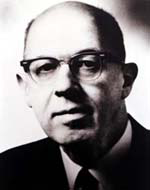Geoffrey H. Moore
Geoffrey Moore | |
|---|---|
 | |
| Commissioner of Labor Statistics | |
| In office March 1969–January 1973 | |
| President | Richard Nixon |
| Preceded by | (Acting) |
| Succeeded by | (Acting) |
| Personal details | |
| Born | February 28, 1914 Rochester, New York |
| Died | March 9, 2000 (aged 86) Bloomfield, Connecticut |
| Education | Harvard University University of California |
Geoffrey Hoyt Moore (February 28, 1914 – March 9, 2000), whom The Wall Street Journal called “the father of leading indicators”,[1] spent several decades working on business cycles at the National Bureau of Economic Research,[2] where he helped build on the work of his mentors, Wesley Clair Mitchell and Arthur F. Burns.[3][4] Moore also served as commissioner of the Bureau of Labor Statistics from March 1969 to January 1973.[1]
In 1946 Moore was teaching statistics at New York University and one of his students was Alan Greenspan,[5] later chairman of the Federal Reserve, who would tell The New York Times that Moore was “a major force in economic statistics and business-cycle research for more than a half-century.”[4] In 1956 he was elected as a Fellow of the American Statistical Association.[6] In 1996 Moore founded the Economic Cycle Research Institute in New York city.[4]
References[]
- ^ a b "BLS History Commissioners Moore". BLS. BLS. Retrieved 23 May 2016.
- ^ "Work of Various NBER Figures". NBER. NBER. Retrieved 23 May 2016.
- ^ Moore, Geoffrey H. (1995). "Following the Indicators". The American Economist. 39: 15–19. doi:10.1177/056943459503900102. S2CID 151622165.
- ^ a b c Hershey, Jr., Robert D. (2000-03-11). "Geoffrey H. Moore, 86, Dies; An Analyst of Business Cycles". The New York Times. Retrieved 23 May 2016.
- ^ Martin, Justin (2000). Greenspan: The Man Behind Money (First ed.). Perseus Publishing. p. 26. ISBN 978-0-7382-0524-3. Retrieved 23 May 2016.
- ^ View/Search Fellows of the ASA, accessed 2016-07-23.
- 1914 births
- 2000 deaths
- Business cycle
- 20th-century American economists
- Fellows of the American Statistical Association
- Distinguished Fellows of the American Economic Association
- Nixon administration personnel
- New York University faculty
- Harvard University alumni